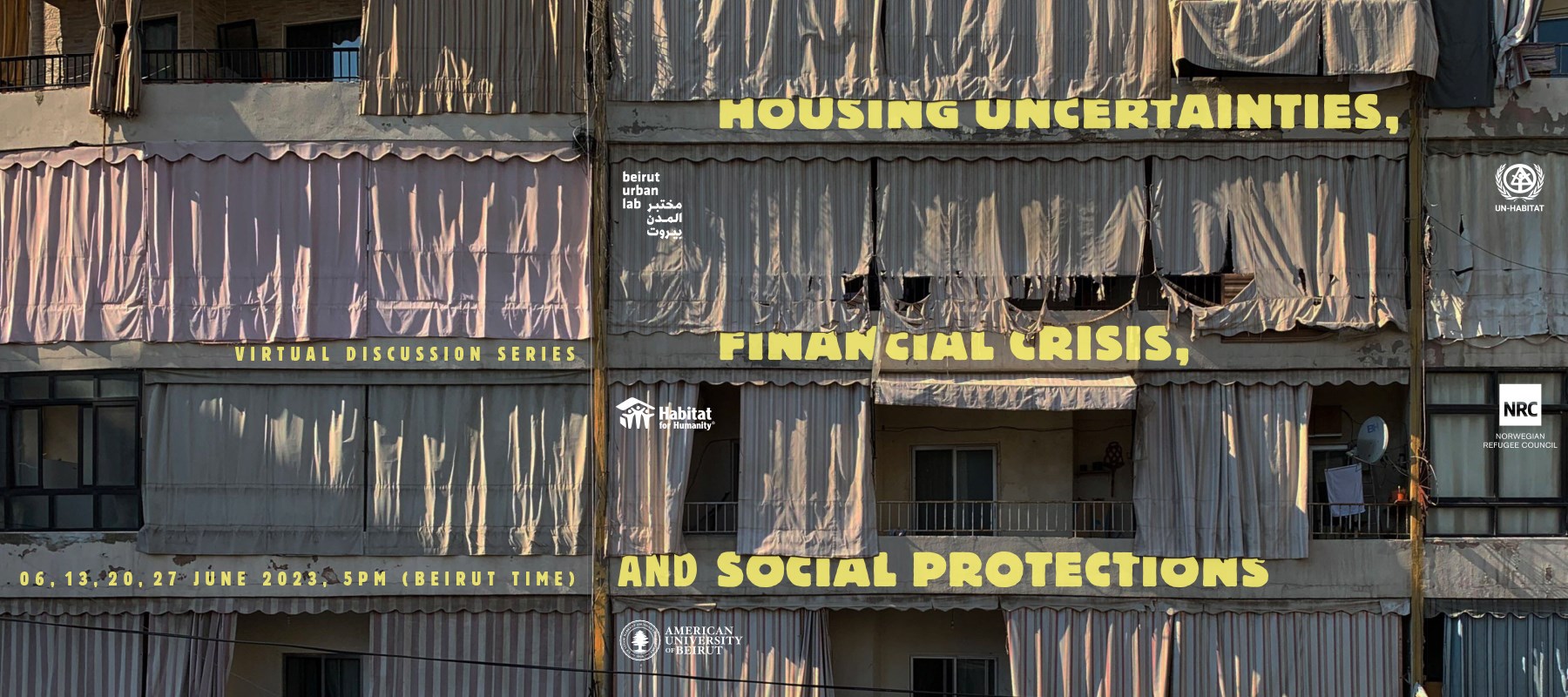Housing Uncertainties, Financial Crisis, and Social Protections

The Beirut Urban Lab (BUL), Habitat for Humanity (HfH) through the Lebanon National Programme and the MENA Urban Housing Practitioners Hub (MENA-UHPH), the Norwegian Refugee Council (NRC), and the United Nations Human Settlements Programme (UN-Habitat) Lebanon Country Programme are organizing a virtual discussion series titled:
Housing Uncertainties, Financial Crisis, and Social Protections
Series dates: Tuesdays 6, 13, 20 & 27 June 2023; at 5:00 pm Beirut Time (GMT +3)
The virtual discussion series seeks to explore comparatively questions at the intersection of housing uncertainties and financial crises. The online event further seeks to probe the possibilities afforded by social protection schemes to respond to the increasingly dire living conditions of today’s urban majorities.
Event Program
DAY 1: 6 June 2023
Opening Session
(5:00 pm – 5:10 pm Beirut Time, GMT +3)
Introduction: Housing in Times of Financial Meltdown
Mona Fawaz (Professor of Urban Studies and Planning, American University of Beirut)
Introductory Comments
(5:10 pm – 5:30 pm Beirut Time, GMT +3)
The Empire Strikes Again: Housing and Extractivism
Raquel Rolnik (Professor of Urban Planning, University of São Paulo)
Discussant:
Mona Fawaz (Professor of Urban Studies and Planning, American University of Beirut)
Panel Discussion 1: Setting the Tone: The Contours of Housing Financialization in the Arab Middle East
(5:30 pm – 7:00 pm Beirut Time, GMT +3)
Early Commodification, Late Financialization, and the Role of Short-term Rental Platforms in the Housing Market of the Greek Capital City
Thomas Maloutas (Professor of Social Geography, Harokopio University)
Land-Infrastructure-Finance Nexus: A View from Egypt
Dalia Wahdan (Associate Professor of Anthropology, American University of Cairo)
The Financialization of Housing in the West Bank
Tareq Radi (Ph.D. Candidate in American Studies, New York University)
Session Chair and Discussant:
Deena Khalil (Manager, MENA Urban Housing Practitioners Hub, Habitat for Humanity International)
DAY 2: 13 June 2023
Panel Discussion 2: Housing Loans, Mortgaged Lives
(5:00 pm – 6:30 pm Beirut Time, GMT +3)
Financializing Social Housing in the Global South: The Case of Egypt's Mortgage Market
Yahia Shawkat (Co-founder and Research Coordinator, 10 Tooba)
Mortgaged Homeownership and the State-finance Nexus: Southern European Countries in the Long Term
Simone Tulumello (Assistant Research Professor of Geography, University of Lisbon)
The Rise and Fall of Subsidized Housing Mortgage Schemes in Post-War Beirut
Soha Mneimneh (Urban Planning Researcher, Beirut Urban Lab, American University of Beirut)
Session Chair and Discussant:
Walid Marrouch (Professor of Economics and the Assistant Dean of Graduate Studies & Research, Lebanese American University)
DAY 3: 20 June 2023
Panel Discussion 3: Urban Precarious Shelters
(5:00 pm – 6:30 pm Beirut Time, GMT +3)
Implementing the Right to Housing in an Age of Insecurity
Leilani Farha (Global Director, The Shift)
Is Informality the Solution to the Housing Crisis?
Solange Munoz (Assistant Professor of Geography, University of Tennessee – Knoxville)
City of Living-Death: Urban Precarity and Social Transformation in an Egyptian Cemetery
Marwa Ghazali (Assistant Professor of Anthropology, University of Houston)
Session Chair and Discussant:
Nanor Karageozian (Urban Analysis and Policy Unit Manager, UN-Habitat Lebanon)
Day 4: 27 June 2023
Round Table 1: Housing and Social Protection in the Arab Region (SP Experts)
(5:00 pm – 6:00 pm Beirut Time, GMT +3)
Zina Nimeh (Associate Professor of Social Protection and Public Policy, UNU-MERIT and Maastricht University)
Rana Jawad (Reader in Social Policy, University of Bath)
Hania Sholkamy (Professor of Anthropology, American University of Cairo)
Sami Zoughaib (Economist and Research Manager, The Policy Initiative)
Moderator: Farah Al-Shami (Policy and Development Economist, Arab Reform Initiative)
Round Table 2: Housing and Social Protection in the Arab Region (Public Sector and NGOs)
(6:00 pm – 7:00 pm Beirut Time, GMT +3)
Salma Yousry (Urban Development Programme Manager, ROAS Egypt, UN-Habitat)
Rony Lahoud (Chairman and General Director, Public Corporation for Housing)
May Abdel Hamid (Chief Executive Officer, Social Housing and Mortgage Finance Fund)
Nanor Karageozian (Urban Analysis and Policy Unit Manager, UN-Habitat Lebanon)
Fouad Bejjani (Shelter and WASH Project Manager, Norwegian Refugee Council Lebanon)
Moderator: Samar Farhat (HLP & Urban Recovery Consultant, Habitat for Humanity International)